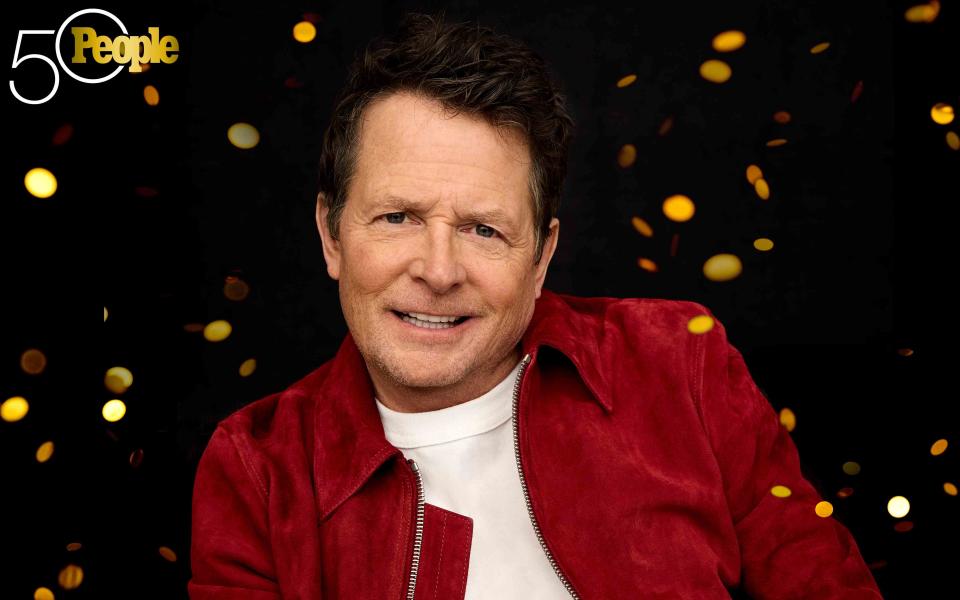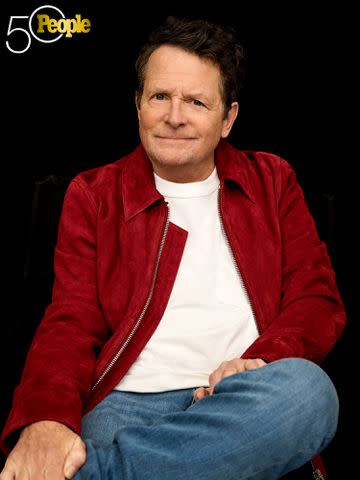Michael J. Fox Laughs and Reflects on What He's Learned Through His Incredible Journey: 'You Can Do Anything'
- Oops!Something went wrong.Please try again later.
The actor and philanthropist leads with kindness — and laughter! — and has proven time and time again that anything is possible

Michael J. Fox’s first big story in PEOPLE appeared in a July 1985 issue, right around the release of Back to the Future. The story concluded, “Nice guys, it seems, can finish first.”
The same sentiment was repeated on the cover in 1989 and many times since, including his most recent cover in 2022, where he encouraged kindness. “I haven’t tried to be a nice guy,” Fox, 62, tells PEOPLE in an interview for the magazine's 50th anniversary special issue. “It’s easier to be nice than to be a jerk.”
Still, his actions speak louder than those words: The Michael J. Fox Foundation, created by the actor in 2000, has raised nearly $2 billion to find a cure for Parkinson’s disease, with which he was diagnosed in 1991.
Do you have a first memory of your experience with PEOPLE?
I have very specific memory of being 12 or 13 years old, and in the Safeway across the street where I lived, and I believe Elton John was on the cover. I was a big Elton John fan, and I didn't have 75 cents or 50 cents or whatever it was to buy the magazine, so I was really bummed. So, I bugged my mom into buying it for me. But that's my first memory of PEOPLE, is that.
And then, as far as my relationship with the magazine over the years, it's been this weird chronicler of my life in a sense. And I would imagine if I looked back at it, it would pick things out. I remember that. I remember that. I remember that as well. I know not everybody has that library of their life at their disposal, but PEOPLE has provided one for me, and I appreciate it.
Looking back at that first feature in 1985, what would you tell your younger self?
Easy on the jumping on trampolines with a guitar. You don’t need to do that. But I was young and impetuous and stupid, and it was fun. The venues [had gotten] bigger. Like, if I did an interview at the beginning, I'd go and sit down in a diner with somebody and crank out a 15-minute interview and have a free cup of coffee and move on. Then, all of a sudden, I was doing it and there were trucks and cranes and boxes and trampolines and any kind of guitar I wanted to play.
Two years later, 1987, was your first PEOPLE cover.
It's a funny deal when you're that famous. And it's beyond being on the cover of magazines. It's like you go to a restaurant, and they pull the best table out of their butts. You don't know where they got it from, but all of a sudden they have a table for you wherever you want it. It was just an insane time.
There was an expression that I referred to when they gave me an honorary Academy Award. Somebody said to me the day before, "You were '80s famous." And I thought, "Wow, that's cool. '80s famous. That's right." We were tougher. We didn't have social media, we didn't have any of that crap. We were just famous, that's from our own resources. And it was an amazing time. '80s famous.

Do you think it was harder then than it is now?
Well, you had to be talented. That helped. We used to bust our ass.
You revealed your Parkinson’s diagnosis in PEOPLE in 1998. What was that experience like for you?
This was really tough. I didn’t want to put it out there, but, given the nature of Parkinson’s, it was going to become evident sooner or later. I was really nervous about it. Todd Gold [the reporter] was really good. He said, "How can I tell this story, get the most out of it for you, get the most out of it for Parkinson's—which I hadn't thought about yet, what impact it would have on the community?"
I'm proud that I had the courage to talk about this, and to be out there with it. And PEOPLE took it seriously and treated it with a sense of gravitas and importance. Because it’s really—it, not me—changed the world a little bit.
In that article, your doctor said he was hopeful you'd be functional for at least another 10 years and you've obviously blown decades past that. What does that mean to you about how things have evolved since then?
What I believed then and what I believe now, I might not put it in the same words, but you can do anything. Anything. You don't have to follow other people's prognostications for what life is going to be. Life's going to be what you make it.
What do you see as your legacy?
It doesn’t matter to me. My [four] kids [with wife Tracy Pollan] are doing well. People has been this chronicler of my life, and I appreciate it. Remember that I was pretty funny and I cared, and all the other stuff just fell in, all the important stuff. I didn't have important stuff in mind when I came down. I just wanted to have a giggle — and I giggled a lot.
Credits
Photographer Art Streiber
Cinematographer Jonathan Cortizo
Set Design Anthony A. Altomare/Buffalo Art Co.
Prop Stylist Joseph Bell
Groomer Kristan Serafino/Walter Schupfer
Stylist Britt McCamey
Wardrobe Jeans: FRAME, Shirt: Randy’s Garments, Jacket: Mr. P, Sneakers: Nike
For more People news, make sure to sign up for our newsletter!
Read the original article on People.

